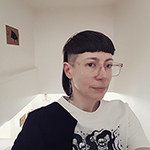 Malahat Review volunteer Paul Monfette talks with the issue #213 contributor about writing as an unearthing, working on novels vs. short stories, and delving into the perspective of a young child for her story, "Primary Organs."
Malahat Review volunteer Paul Monfette talks with the issue #213 contributor about writing as an unearthing, working on novels vs. short stories, and delving into the perspective of a young child for her story, "Primary Organs."
PM: What did you draw on within yourself to inhabit the body/mind of six-year-old protagonist/narrator Eileen in "Primary Organs”?
RL: Empathy is integral to my writing process, so when writing Eileen, I didn’t just want to write her—I wanted to understand her worldview by stepping into her mind. Recalling memories from when I was Eileen’s age was helpful for this, and one of the story’s details is actually a true story! I remembered being in my grade one gym class, and my teacher talking about shoe soles. For a moment, I wondered if he was referring to souls, since I’d never heard the word before. This was a fleeting thought, but I somehow remembered it during drafting. It was a great reminder of the specific brand of curiosity young children possess and I tried to integrate that into the narrative.
Read the rest of Rachel Lachmansingh's interview.
Winter Issue Interview with Megan Butcher on CNF
 Malahat Review volunteer Samantha Fitzpatrick talks with the issue #213 contributor about testing the limits of fear, the enmeshed singularity of being in nature, and the need for tension when writing her essay, "First Birds."
Malahat Review volunteer Samantha Fitzpatrick talks with the issue #213 contributor about testing the limits of fear, the enmeshed singularity of being in nature, and the need for tension when writing her essay, "First Birds."
SF: On your blog, you’ve written about having difficulty reading since the pandemic began—a struggle plenty of people have been having. Has the pandemic affected your writing? Are you working on anything now?
MB: The pandemic did affect my writing, but thankfully not in the way it affected my reading. There’s a bit of a winding story there, if you’ll bear with me. I went through a very long period of writer’s block between about 2014 and 2019. For much of that period I could barely stand to think about writing, it hurt so much to not be doing it. And yet I just couldn’t. In an effort to break myself out of it, I took a couple of writing workshops at Carleton University in 2019. “First Birds” started as an assignment in a creative nonfiction workshop where I had a great teacher and supportive peer-editing group. Getting good feedback from them felt good; surviving the less positive feedback was what allowed me to really write again. Their gentle and thoughtful voices replaced the really vicious ones that had been in my head for a few years.
When we hit that first lockdown back in the spring, I was just a few months done the course. I was floundering. With no assignments I had no exoskeleton, and I couldn’t seem to piece together any internal bones. But I think those first few weeks of lockdown changed me in some fundamental ways. Now that it’s been dragging on almost a year, I do find it a bit hard to access the fear I felt in March and April 2020, but I remember having a sudden and very clear sense of the possibility that I might die before I got to write a book, and that I could not allow that to happen. That it was better, in fact, to have dozens of people reject me than to allow the fear of rejection, of my inabilities, of my inner failings, to stop me from writing. I would not die not writing.
Read the rest of Megan Butcher's interview.